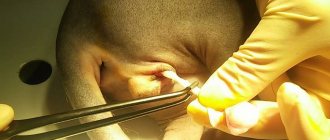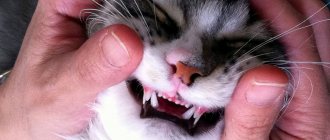Castration of cats - a procedure that eliminates libido and corrects the behavioral manifestations of an animal’s sexual activity. As a result of the removal of the testes, reproductive function is irreversibly stopped, and the production of the male hormone testosterone also stops, which affects behavior. The main reasons for castration are difficulties in keeping cats after they reach puberty, as well as medical indications.
Cat in a protective collar after castration
Methods
In veterinary practice, various methods of castration of cats are used. Each of them has its own characteristics, advantages, optimal age and possible undesirable consequences. Before deciding to choose a castration method, you should consult with a veterinarian, who will determine which is best, taking into account the age and condition of the cat. Currently, the following types of procedures are used in veterinary medicine.
Chemical
Castration involves the regular administration of medications that suppress estrus. Chemical castration of cats is a reversible procedure: after some time after stopping the use of drugs, sexual function and the ability to reproduce are restored.
Surgical
The surgical method is used most often in veterinary practice. The technique is as follows: the scrotum is cut, the spermatic cords are tied up, the testes are cut off and taken out. Surgical castration is performed under anesthesia; the recovery period lasts until the cat’s wound heals.
Mechanical
Bloodless (or mechanical) sterilization of a cat involves squeezing the vas deferens with veterinary forceps. As a result, the ducts atrophy and dissolve over time. The bloodless method is irreversible. Its advantages include low cost and short rehabilitation.
Radial
The essence of the method is to expose the testes of cats to certain doses of radiation. After castration by irradiation, a cat's eggs stop producing hormones and viable sperm. Radiation sterilization has many disadvantages: after irradiation, the risk of developing inflammatory processes and the formation of malignant tumors increases significantly.
Hormonal
This is the name of medical castration using hormonal drugs. The introduction of hormones of the opposite sex temporarily suppresses sexual function. The procedure is considered reversible. Chemical and hormonal castration does not require preliminary preparation and long-term rehabilitation of the cat.
Vasectomy
The operation involves ligating the vas deferens. The cat loses the ability to reproduce, but the ability to mate and sexual reactions are fully preserved. Vasectomy is a complex operation; the recovery period after it lasts about two weeks.
Types of castration
Surgical and non-surgical methods are used.
Surgical methods:
- Open method - the scrotum is greatly stretched and an incision is made. The testis is removed, the vaginal membrane is freed from it using scissors. The spermatic cord is removed and tied to itself. The same is done with the second testis, after which they are removed.
- With the closed method, the tunica vaginalis is not opened, but only an incision is made to remove the testis and the tunica vaginalis from the scrotum. A ligature is applied to the spermatic cord and cut off. The skin of the scrotum is not sutured.
- The bloodless method or castration without removing the testicles consists of squeezing the spermatic cords with special forceps, after which, after 5 months, they are reabsorbed.
- Vasectomy is a gentle method of sterilization: the seminiferous tubules are partially destroyed, which serves as an obstacle to sperm entering the penis. The testes continue their work, and the cat continues to demand a female, but cannot continue the race.
Non-surgical methods do not involve removing the testicles. This includes chemical castration in the form of injections, tablets or the introduction of a Suprelorin implant.
Complexity of the procedure
Surgical removal of the testes is not a complex operation. If the cat was properly prepared for the procedure, all manipulations were carried out by a qualified specialist in compliance with the technique, complications after castration are minimal or absent.
Young cats tolerate castration well and, with proper care, recover fairly quickly. Castration of an adult cat may be associated with certain risks: the difficulty lies in the fact that older males and those suffering from heart disease may experience complications from the cardiovascular system during the operation. In this regard, local anesthesia is recommended for such animals.
General facts
Castration is considered not such a simple operation as many assume. This is not just the removal of the testes: during the operation, the glands of the genital organs are cut and the reproductive functions of the body are completely stopped. The procedure can be carried out using several methods:
- Standard excision. This technique is the most common and simple.
- Fertility with the help of medications. For this, an implant is sewn under the skin with the required amount of medication that suppresses the cat’s sexual desire. This is an expensive but safe procedure.
- Chemical sterilization, during which a mixture of drugs is injected directly into the testes. This compound destroys the glands. Their tissue is then replaced by muscle tissue. This procedure, which has not taken root in our country, is considered easy to use and cheap.
- Castration under the influence of radiation. The organ is placed under gamma rays and treated. Such manipulation requires quite expensive equipment. From a safety point of view, this is a simple intervention that does not require anesthesia.
It is clear that surgical penetration into the animal's body is not always necessary. However, it is excision with a scalpel that is popular in domestic veterinary practice. Most likely, this is due to the low cost of the method.
Points for and against
Many cat owners are wondering: is it necessary to castrate a pet and how justified is castration from a physical and moral point of view? In the natural habitat after puberty, the main purpose of a male’s life is reproduction. Domestic cats walking outside have their own territory, which must be regularly marked and defended. The result of contractions is injury and stress, and constant contact with street animals poses an increased risk of contracting infections and parasites. Neutered cats do not pose a danger to other males and do not participate in fights.
Do animals that do not go outside need sterilization, because in this case the possibility of contact with street cats is excluded? A domestic adult cat without castration will constantly look for a female to realize the reproductive instinct. If he yells, doesn't eat, doesn't sleep well, constantly marks corners, becomes aggressive and ruins things, this could be the first sign that he wants a cat. Does castration help cope with this behavior of a pet? A castrated cat stops marking, and changes in behavior will also occur: the animal’s character will become more docile. What other arguments are there for and against intervention?
pros
Those who are unsure whether to undergo surgery on their pet should evaluate the pros and cons of castration of cats. The positive aspects of the intervention include a beneficial effect on the psychological and physical condition of cats. The advantages of castration of a cat are that the operated males live longer, and they do not have problems with the prostate.
Minuses
So should the cat have surgery? There aren't many negative points. These include possible complications, the risk of which exists with any surgical intervention.
Common Myths
- Myth 1. The cat will stop marking immediately after the procedure.
In fact, everything is individual, and whether a cat will stop marking after castration depends on the timing of removal of the testes. If the procedure is carried out at puberty, then the change in the cat’s hormonal levels will take some time. It happens that a cat shits after castration, thus marking its territory due to the lack of a secret. About 5% of males do not stop leaving marks at all. This problem occurs in those cats that have already been in contact with females: their hormones are produced not only in the testes. That is why it is impossible to unequivocally answer the question of whether an adult pet will mark after castration. To prevent domestic cats from marking, the operation should be performed at a young age.
- Myth 2. Neutered cats have a bad character.
Cases where a cat becomes aggressive after removal of the testes are quite rare. Animals, on the contrary, calm down and become more affectionate and tame. Males behave aggressively after castration has been carried out only due to deterioration of their condition or the appearance of any irritating factors.
- Myth 3. Castration causes cats to get fat.
Weight gain can be caused by poor diet or eating too large portions. Typically, a neutered cat will look the same as before surgery if feeding is adjusted to account for the reduction in energy expenditure.
- Myth 4. A castrated cat does not catch mice.
Many people are concerned about the question: can cats hunt after castration? In this regard, the animal continues to lead the same lifestyle as before.
These and other common myths about castration have nothing to do with reality and should not influence the decision of a cat owner.
Nutrition for castrated cats
After castration, the cat’s diet and frequency undergo significant changes:
- feed the animal often, but not much; you should not leave a large amount of food in its bowl;
- when gaining excess weight, switch the animal to low-calorie food;
- provide free access to drinking water, preferably warm;
- It is better to feed the animal with special food that is designed for castrated cats;
- reduce the intake of calcium and magnesium, they contribute to the formation of stones in the genitourinary system;
- Regularly add fermented milk products to your cat’s menu, which improve metabolism.
It is important to remember that a veterinarian can select the appropriate food for a neutered cat.
© shutterstock
At what age should I do it?
When can a cat be neutered? The optimal time recommended by experts is 3-4 weeks before puberty. So at what age is it better to castrate a cat? It all depends on the breed: Abyssinians, Burmese and other oriental breeds mature earlier - by 5 months, other cats reach the optimal age by 7-8 months.
Castration too early is undesirable for the reason that before the onset of puberty, the genitourinary system of cats is still developing.
Contraindications for carrying out
Castration is performed under general or local anesthesia. Not all cats are able to tolerate anesthesia due to age, the presence of certain diseases, or allergies to medications. The first thing you need to know before the procedure is whether your pet has an allergic reaction to the drugs and whether his heart is able to function normally during the procedure. To establish possible contraindications for the intervention, the cat must first be examined by a veterinarian. Permission is given after analyzing the results obtained.
Who can get vaccinated?
Another popular question is who can get vaccinated against coronavirus? Currently, any resident of Moscow can get vaccinated if they do not have any contraindications to immunization, which are discussed below.
We recommend that you definitely get vaccinated against coronavirus if you are part of one of the groups most vulnerable to infection:
- belong to the age group of 60 years and older, in whom the disease, according to statistics, is most severe, and also often develops post-infectious complications;
- suffer from one or more chronic diseases;
- Due to the nature of their work, they are forced to come into daily contact with a large number of people, among whom there may be carriers of the infection;
- study at a higher or secondary specialized educational institution (after 18 years).
The procedure is absolutely voluntary, and anyone can refuse it.
Preoperative period
In order for castration to take place without complications, the pet must be properly prepared. You need to start with a visit to the veterinarian. He will examine the animal, prescribe additional examinations if necessary (ultrasound of the heart, blood and urine tests), and tell you how to prepare the cat for removal of the testes. Typically, preparing a cat for castration involves following a special feeding and drinking regimen. In each specific case, the preoperative period may differ slightly.
Preparation for the procedure
What should you do before the operation? 12 hours before the scheduled visit to the clinic, you must stop giving the animal food. Feeding a cat before surgery is not recommended due to the fact that anesthesia causes a gag reflex, and the animal may choke on vomit. They stop giving him water 3 hours before the planned castration. In some cases, it is necessary to give a cat a laxative before castration. There is no need to wash or clip the animal.
How does the intervention work?
Many owners worry that the cat experiences pain and discomfort during the procedure. In fact, the only unpleasant moment is the injection of an anesthetic drug. Regardless of how cats are castrated (under general or local anesthesia), they do not feel pain.
As soon as the anesthesia takes effect, the doctor proceeds directly to the manipulation. How this happens depends on the type of procedure chosen. Typically, the testes are removed through two small incisions in the scrotum, after ligating the spermatic cords. At the end of the procedure, the veterinarian will give detailed instructions on how to care for the cat after castration.
Should you get vaccinated?
Many Muscovites doubt whether to get vaccinated against coronavirus, and their fears are understandable. The vaccine was registered under an accelerated procedure, but its trials have not yet been completed. In addition, there is still no exact data on how the drug will affect people who have already had latent illness or are currently ill. And the period during which immunity to coronavirus will work is still not precisely known.
At the same time, there are many compelling arguments in favor of vaccination.
- The effectiveness of the Sputnik V vaccine, according to tests, is 96%. This means that 96 out of a hundred people at the end of immunization will not get sick after contact with infected people, and if infection does occur, they will suffer a mild form of the disease.
- So far, no cases of severe, let alone lethal, consequences of the introduction of Sputnik V have been registered, while a number of foreign vaccines have many questions related to their safety.
- After receiving the coronavirus vaccine, you may be freed from some social restrictions. For example, many countries are planning to introduce or are already introducing the most favorable regime for vaccinated people. It is possible that the Russian authorities will follow their example.
- At the clinic of JSC "Medicine" a thorough check of patients is carried out before administering the drug. Such strict measures serve as an additional guarantee that there will be no unpredictable consequences.
- The drug for vaccination against coronavirus in Moscow is currently provided to residents of the capital free of charge.
Postoperative period
To quickly restore the cat and prevent complications, it is necessary to follow all the specialist’s recommendations in the two-week period after the intervention. Features of care on the first day depend on how long the anesthesia wears off after castration of the cat. Animals that require castration under general anesthesia require the most attention.
Post-operative care
Upon returning from the clinic, the cat should be placed on a bedding and covered, since as a result of the administration of painkillers, natural thermoregulation is disrupted. Every 20-30 minutes it must be turned over on one side or the other, which will make it possible to prevent numbness and muscle spasms. As cats recover from anesthesia, they may experience unsteadiness on their paws, a staggering gait, and blurred vision. After castration, a cat may behave somewhat strangely: hide, not make contact, or be restless and overly active. During the first few days after castration, this behavior is within normal limits.
If the cat starts to get up, you need to place a tray nearby so that he doesn’t have to go far. Sometimes 1-2 times after surgery, a disoriented animal may wander past the tray or diaper. In this case, you should not scold the cat, since these are just consequences of the operation.
If your cat licks stitches too often or suffers from oral diseases, a special collar may be required in the postoperative period. It will prevent infection and suture dehiscence. How long to wear a collar? The timing is determined by the veterinarian depending on how long the wound takes to heal. It is recommended to bathe the animal no earlier than 2 months after the procedure. If necessary, contaminated areas can be wiped with a damp, well-wrung out sponge.
Proper care in the first days is very important, since the successful outcome of the procedure largely depends on it.
How long does it take to recover from anesthesia?
To correctly assess your pet’s condition, you should know how long it takes for cats to recover from anesthesia. It all depends on the method of pain relief, the characteristics of the body, the drug and the correct calculation of the administered dose.
So, how long does it take for a cat to recover from anesthesia after castration? Sleep usually lasts from 30-40 minutes to 4-5 hours. If a castrated cat does not come to his senses for a long time, you should periodically check his reactions: touch his nose, paws, ears. The cat's attempts to pull his paw or move his ear indicate that there is no reason to worry.
Feeding
Caring for a cat after castration includes a certain drinking and feeding regimen. As soon as the animal wakes up, it needs to moisten its larynx. To do this, a small amount of liquid is poured into the cat’s mouth in small portions, since the swallowing reflex is not restored immediately. A bowl of water is placed when the cat has completely recovered from the effects of the drugs.
Feeding a cat is carried out only if the animal itself shows interest in food. You shouldn't do this by force. Portions should be small, and the volume of food the cat should be increased gradually.
What to feed
What to feed a cat after castration? In the first days, it is worth giving light food: meat or fish puree, dry food pre-soaked in water.
After how long
How long after castration can you feed a cat? Typically, 7-8 hours are enough to recover from anesthesia. You can give food to your cat no earlier than this period.
Complications
All possible complications of castration are divided into those that occur immediately after the procedure and later ones that appear during the healing process. In the first hours after the cat has undergone surgery, it is necessary to monitor its condition. If swelling, wheezing, or a sudden change in temperature or color of the mucous membranes occurs, you should immediately seek medical help. A cat’s poor reaction to anesthesia can result in death if not intervened in a timely manner.
The most common postoperative complications in cats include swelling and hematomas. In such cases, the animal does not go to the toilet for a long time, licks the enlarged scrotum, and shows anxiety. As a rule, blood or lymph that has accumulated in and around the scrotum dissolves on its own after some time.
Castration can cause more dangerous complications in cats: infection of the sutures (accompanied by fever and purulent discharge), damage to the urethra (the cat's urine will contain blood), bleeding and hemorrhages. In order for castration to take place without complications, it is necessary to properly care for your pet and trust it only to a proven, qualified specialist.
How long does it take for a wound to heal after castration? With standard castration, a period of 7 to 10 days is considered the norm.
What is the price
Russia
- Moscow and St. Petersburg – 1000 – 3000 rubles;
- Regions of Russia – 850 – 2500 rub.
Ukraine
- Kyiv – 350 – 900 hryvnia;
- Regions of Ukraine – 250 – 500 UAH;
Be careful when choosing a clinic. If a small and attractive price is indicated, it is quite possible that this is a marketing ploy with which they are trying to lure you.
A suspiciously low price for castration indicates that you may be additionally billed for anesthesia, medications and consumables. Take the time to find out everything in detail before you sign up for the operation.
Anesthesia
Regardless of the age and condition of the animal, anesthesia is required when castrating cats. Today, two types of anesthesia are used in veterinary practice: general and local.
General
Painless castration is often performed under general anesthesia. To euthanize the cat before castration, medications may be administered or inhalation anesthesia may be used. Gas euthanasia is more expensive, but has several important advantages: it has a minimum of side effects, the intensity of the gas supply is adjusted during the castration process, and removing the cat from anesthesia is easier and faster.
Local
Local anesthesia during castration is considered more gentle: it does not require long recovery and does not have such a negative effect on the cat’s body as general anesthesia. However, this method of pain relief is only suitable for calm cats.
Post-operative care
Castration of Siamese cats or other breeds is a simple operation and therefore does not require special care. Doctors recommend monitoring the animal’s behavior in order to identify complications in time. Pets tend to lick the wound, so it is advised to buy a special cat collar. To prevent the seams from coming apart, a blanket is put on the cat. You should wear it for the first 2-3 days. It is better to place your pet's sleeping place near the floor so that it does not fall and get hurt. It is advisable to buy filler for the tray in a light color: against such a background it is easier to notice drops of blood if complications such as bleeding occur. Sutures should be treated with ointment 2 times a day. If you follow all these rules, then castration will only improve the cat’s life.
To prevent the animal from touching the seams again, you should buy him a protective collar.
Where to castrate
After the decision to sterilize the pet is finally made, the question arises: where to castrate the cat? Sterilization can be carried out both in the clinic and at home.
Vet clinic
A veterinary clinic is the best option, since if critical situations arise, the doctor will have all the necessary equipment at his disposal. Castration of a cat in the clinic is mandatory if there are liver and kidney diseases. You should not take risks in cases where the age of the male is more than 3-4 years. In addition, when contacting the clinic, data about the cat and all manipulations performed are entered into the medical record. The veterinary clinic also issues the cat owner a contract and a receipt confirming payment for services.
At home
Castration of a cat at home is associated with certain risks. If the owner decides to call a doctor at home, it is necessary to make sure that he is qualified and has a license to perform operations, including castration of cats. It is also important to provide conditions for performing the procedure. Castration at home is allowed at a young age and in the absence of health problems.
Castration of cats is a serious procedure that requires sufficient qualifications of a specialist and compliance with certain conditions before and after it. In each specific case, the veterinarian assesses the situation and gives individual recommendations on how best to castrate the animal and what kind of care to provide it.
Castration of cats
Castration of stallions
Dog castration
When will vaccination start?
Many people are interested in when vaccination against coronavirus will begin in Moscow. We hasten to please our patients: it already began in December 2022 and continues to this day. At the initial stage, the event was held only among certain categories of people - those who, due to the nature of their professional activities, cannot limit the number of their contacts, those who are sufficiently young and healthy, and have reached the age of majority. At the clinic of JSC "Medicine" you can get vaccinated against coronavirus in comfortable conditions. The service is available to all citizens of the Russian Federation. More details on the services page.











